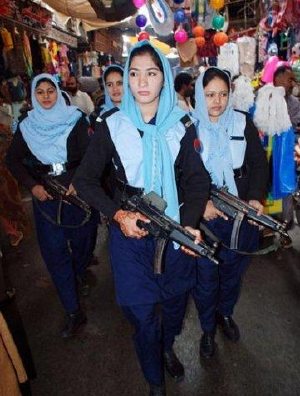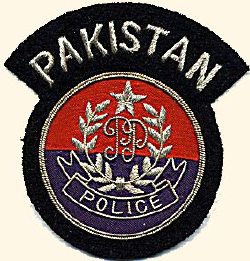 It is impossible to effectively address Pakistan’s myriad problems so long as security conditions continue to deteriorate. We are unable to control our own territory as armed militias and criminal gangs run amok in our cities, towns and villages.
It is impossible to effectively address Pakistan’s myriad problems so long as security conditions continue to deteriorate. We are unable to control our own territory as armed militias and criminal gangs run amok in our cities, towns and villages.
Sectarian violence is growing unabated. Business is fearful and the economy in tatters. Many of those with resources are making plans to migrate. Meanwhile, terrorist organisations freely launch attacks at home and abroad, with the government unable to provide security even in the capital.
Since we have sunk to this point mostly during Gen Musharraf’s nine years in power, it is time to re-examine the fundamental security strategy of Pakistan.
For decades the army has functioned under the increasingly questionable assumption that the greatest threat the country faces is a military confrontation with India. The armed services have accordingly consumed great proportions of Pakistan’s tight budget ($4.4bn for fiscal year 2008-2009, a seven per cent increase over the previous year) in preparation and readiness for a conventional war that they cannot win. As part of the same strategic objective, in the hopes of keeping large numbers of Indian troops (close to 700,000 at last count) occupied in Indian-held Kashmir, the army allegedly trained fundamentalist militant groups and encouraged them to wage attacks there.
At the same time, it is alleged that our military and intelligence establishment trained and supported the Taliban in Afghanistan with the purpose of having a friendly government on the western border over which Pakistan could exercise its influence (all part of the dubious policy of ‘strategic depth’ in case of a war with India). Of course, the predictable blowback from these operations has resulted in the current state of near-complete lawlessness in large parts of the country, as well as every province being awash in weapons.
Have any strategic goals been reached? No. Is the Kashmir problem any closer to a solution? No. Do we have a friendly government on our western border? No. What we have achieved is an insecure and crumbling state that could well become a pariah in the international community.
We have already demonstrated we possess a credible nuclear deterrent and must realise that we hurt only ourselves by imagining India as an enemy hell-bent on our destruction. India is a fast-growing economic giant, focused on lifting itself out of poverty. It has little to gain from any attempts to capture Pakistani territory and everything to gain by having a stable and prosperous neighbour as a trading partner. The Kashmir issue can and should be resolved through diplomatic pressure and international support.
In any case, we must ask ourselves whether the well-being of 170 million Pakistanis can be forever held hostage to the fate and future of the Muslim community in Indian-held Kashmir, especially after more than 60 years of support has not improved the situation for them one jot, but has led to disastrous results for us.
 The present danger to Pakistan comes from the lawlessness and terrorism in the country and the government’s inability to effectively project authority and guarantee the safety of its citizens. Jihadist organisations with foreign funding appear to have joined hands with the Taliban and their sympathisers to wreak havoc in the country with their ultimate retrograde dream of creating a mediaeval society where a draconian interpretation of the Sharia is enforced, women kept as chattel and modernity and progress defeated.
The present danger to Pakistan comes from the lawlessness and terrorism in the country and the government’s inability to effectively project authority and guarantee the safety of its citizens. Jihadist organisations with foreign funding appear to have joined hands with the Taliban and their sympathisers to wreak havoc in the country with their ultimate retrograde dream of creating a mediaeval society where a draconian interpretation of the Sharia is enforced, women kept as chattel and modernity and progress defeated.
Some of these groups are determined to attack and intimidate, if not eliminate, religious minorities. Then, we have the heavily armed militias affiliated with political parties. Finally, there are the criminal gangs involved in drug trafficking, kidnapping, carjacking, extortion, armed robbery and murder.
The idea that the army can somehow defend the country against this lawlessness is ludicrous. How can the armoured corps help fight sectarian car-bombings in Karachi? How will yet another squadron of F-16 aircraft defeat the drug smugglers in Lahore? How does the infantry do the detective work necessary to bring kidnappers and carjackers to justice? How can the army deal with the creators of mayhem that are thoroughly dispersed within our population, in every town and every city? It cannot. Yet the armed forces consume a hugely disproportionate share of Pakistan’s federal budget.
So, here is my suggestion: reduce the size of the Pakistan armed forces by a third, and use the money saved to dramatically increase the police budget. Currently defence spending is 20 per cent of the federal budget, while slightly over one per cent is spent on policing. This move will allow at least a six- to seven-fold increase in the police budget. Give our brave police the salary, equipment, training and manpower they need to bring law and order back to our cities and towns. They are the ones paying the highest price in terms of lives, and they are the only ones with a chance of controlling the proliferation of weapons and our epidemic of crime and terrorism.
Explain the decision candidly to our neighbours, refuse to be drawn into a no-first-strike nuclear policy and make a security pact with the United States to deter any hostile actions by India. It is in both those nations’ interest that Pakistan be stable and well-policed. This will also have the salutary effect of significantly reducing corruption in the country, and will result in an atmosphere of security and justice in which healthcare and education can be delivered effectively, and business can start dealing with the challenges of the 21st century economy.
Syed Abbas Raza, editor of 3QuarksDaily (3QD), wrote this piece for Dawn.




















































It’s a good idea to start with. To improve our police, we have to increase their salaries, benefits and give them good equipment. Ultimately you will start drawing good qualified people in the police force.
Please don’t. Army is the only organisation (good or bad) that we have. Things will be worst if the army is made to shrink.
Given enough resources we can have a police service as professional and compotent as the military.
Jitna gurh dallo go utni shakkar ho gi.
We have the police we have because we do not invest in it. So, the idea of investing more resources in the police is a good one. We know from the Highway police and Islamabad police that this works.
In 2007, the US allocated $731 million to help the country’s military and only $4.9 million for its police. That is 0.6%
The same happened throughout 2001-2006. The US was promised the share of police spending would be raised to at least 10%.
Police officers have guns from ancient times; they’re better than muskets but useless.
The officers joining the Police through the FPSC are far better educated than their compatriots in the army. The political interruption in police procedure, mismanagement, lack of funds and de-moralized soldiers lead these bright young men to become a part of the police system we inherited from the British. Keep the people in check, control them, not protect them.
Nonetheless, the CrPC needs to be amended in order to check the vast arresting powers allowed to the police which they use to harass the people as well.
Another point is the ill fated National Criminal Database. Started somewhere near 2003 with US support, it has not yet managed to take off. NADRA was so eager and kind to establish Verisys for the financial sector because it gets Rs. 35 for every query through Verisys, but it has not been friendly with the establishment of the NCDB. The AFIS being set up jointly by FIA and the NPB are also good projects, but keeping in mind nearly 70 percent of all adults are already registered with NADRA, the establishment of the NCDB and an electronic police record system should be the priority.
The only forensic lab in running is in Islamabad, that too donated by the PRC for a million USD. If the Armed Forces can just donated a percentage of money they earn through their clever DHAs , we can establish many a forensic lab, control crime and bring justice to the people.
Two good reads on police reforms, one from Dr. Shoab Suddle (Former IG Sindh Police, DG IB, DG NPB at present)
http://www.unafei.or.jp/english/pdf/PDF_rms/no60/c h05.pdf
Dr. Hasan Abbas, fellow ISPU
http://ispu.org/files/PDFs/ISPU%20-%20Police%20Ref orms%20in%20Pakistan%20Report.pdf
Police Record and Office Management Information System (PROMIS)
http://www.npb.gov.pk/projects/promis.asp
AFIS on NPB and FIA
http://www.npb.gov.pk/projects/afis.asp
http://www.fia.gov.pk/prj_afpis.htm
NCDB on FIA
http://www.fia.gov.pk/prj_ncdb.htm
Some fresh idea with new thoughts. I know a lot of people will have some negative things about our police but at the same time, the fact remains that our police came from us. We didn’t import them from some other country.
A police man who is brought up in some neighborhood is more effective to control the crime (since he knows a lot of people in that vicinity) than asking army or rangers to come and bring the crime down. Yes I know the same person can harm a lot if he/she decides to do the crime but its a moral issue and sadly we (pakistanis) struggle at that end too.
The question is WHO can do it. I think it should be a gradual decrease over the period of lets say 5 or 10 years and also Government should have some other jobs available for for those people coming out of Army.
We need to start manufacture things like China & India. If they can do it, then why can’t we?
Pakistan ZindaAbad